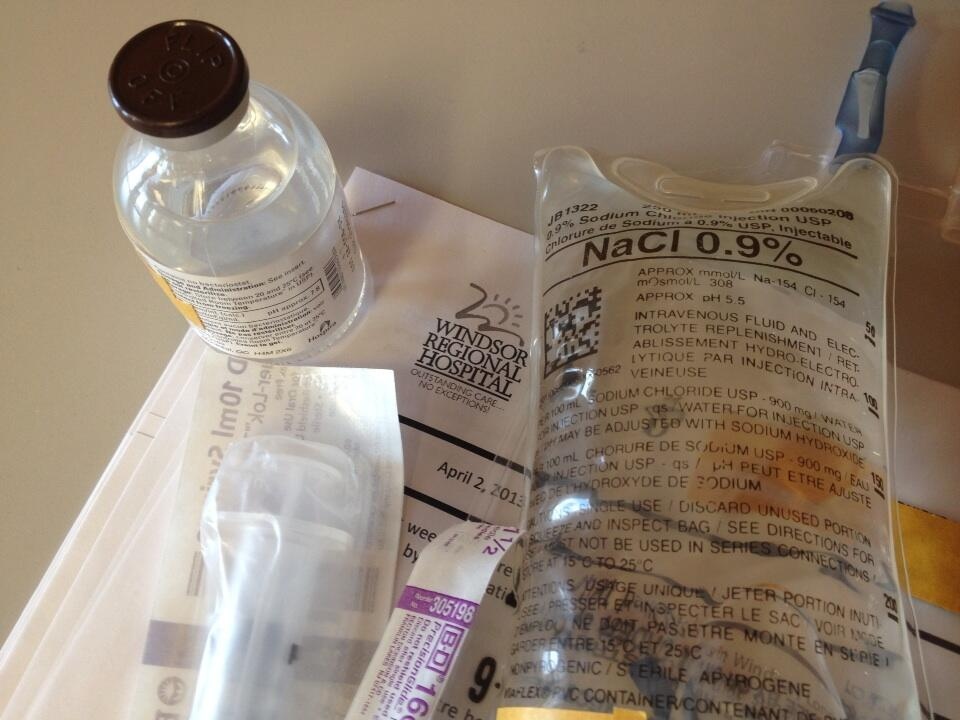Nearly 1,200 cancer patients in Ontario and New Brunswick have been given lower than intended doses of certain chemotherapy drugs, health care officials announced Tuesday.
In Ontario, 990 patients at four hospitals -- London Health Sciences Centre, Windsor Regional Hospital, Peterborough Regional Health Centre and Lakeridge Health in Oshawa -- received diluted chemo drugs.
Saint John Regional Hospital in New Brunswick also said Tuesday that it’s in the process of notifying 186 cancer patients who were given diluted medication.
The drugs in question are cyclophosphamide and gemcitabine. Batches of them were watered down anywhere between three and 20 per cent.
They were purchased by the hospitals from the same supplier, Marchese Health Care, who is responsible for mixing and labeling the drug bags.
The premixed bags contained too much saline solution, which diluted the drug dosage given to each patient, according to an explanatory note posted on Windsor Regional Hospital’s website.
The mistake was caught last week by a pharmacy technician in Peterborough, Ont. The diluted chemo treatments had unknowingly been administered for more than a year in London and Windsor, Ont.
In a news release, Cancer Care Ontario said the affected hospitals are “working closely with the supplier in order to find out the cause of the error.”
Marchese Health Care defended itself in a statement Tuesday, saying: “Our preliminary investigation of this issue leads us to be confident that we have met the quality specifications of the contract we are honoured to have been awarded."
- Are you a patient who may have been affected by the diluted chemotherapy drugs? Email us at newsonline@bellmedia.ca or torontodesk@ctv.ca
The majority of the patients affected were in southwestern Ontario – 665 who were treated in London since March 1, 2012 and 290 who were treated in Windsor since Feb. 24, 2012.
An additional 34 patients treated at the Oshawa hospital since March 12 of this year were given lower drug dosages and one patient in Peterborough was affected last month.
When the hospitals were notified of the problem, they immediately removed the affected chemo drugs and notified the manufacturer, Cancer Care Ontario said.
“Each hospital has secured appropriate supplies of the medications for all subsequent treatments. Patients' treatment cycles will not be interrupted during this transition,” the agency said.
Dr. Carol Sawka, vice-president of clinical programs and quality initiatives at Cancer Care Ontario, said in a statement that “chemotherapy preparation and delivery is a complex process and as a result of this complexity, there are sources for potential error.”
CCO said the effects of the diluted chemo treatments are patient-specific and is encouraging those affected to discuss the situation with their oncologists.
But experts believe the watered-down drugs will likely have little to no impact on treatment outcomes because the dosage reductions were relatively small when taken as part of a chemo drug cocktail.
"The concern about lower doses is that that over time it may produce an inferior outcome….but the evidence that links lower doses to inferior outcome are pretty sparse,” said Sawka.
The affected hospitals are now in the process of notifying patients and scheduling meetings with their doctors.
Neil Johnson, vice-president of cancer care at London Health Sciences, said errors in mixing chemotherapy drugs are “very rare.”
“It is very uncommon…I have long history of being a pharmacist and a health care administrator and I’ve never seen a case like this,” he told CTV London.
Windsor Regional CEO David Musyj told CTVNews.ca that the hospital never had a problem with the drug supplier before.
He declined to name the supplier, saying the company had threatened legal action if they were named publicly after news of the diluted drugs broke. A ministry of health official told CTV Toronto that Marchese was the supplier.
What are cyclophosphamide and gemcitabine?
Cyclophosphamide is used to treat breast cancer and lymphoma, among other types of cancers. It’s also used on patients battling certain types of leukemia, myeloma and non-Hodgkin’s lymphoma.
According to a letter sent to affected cancer patients in Windsor, cyclophosphamide is combined with other cancer medications to increase their effectiveness and is not considered to be the most important part of a chemo treatment.
Gemcitabine is used to treat pancreatic, breast, ovarian and lung cancers. It can also be used for treatments of other cancers.
For patients who have questions about the drug dosages and their cancer treatments, three of the hospitals have set up call centres.
London Health Sciences Centre: 519-685-8805, or toll free: 1-855-464-3262
Windsor Regional Hospital: 519-255-8698
Lakeridge Health, Oshawa: 905-576-8711, ext. 6404
With reports from CTV’s John Vennavally-Rao, CTV Toronto’s Paul Bliss and CTV London




































